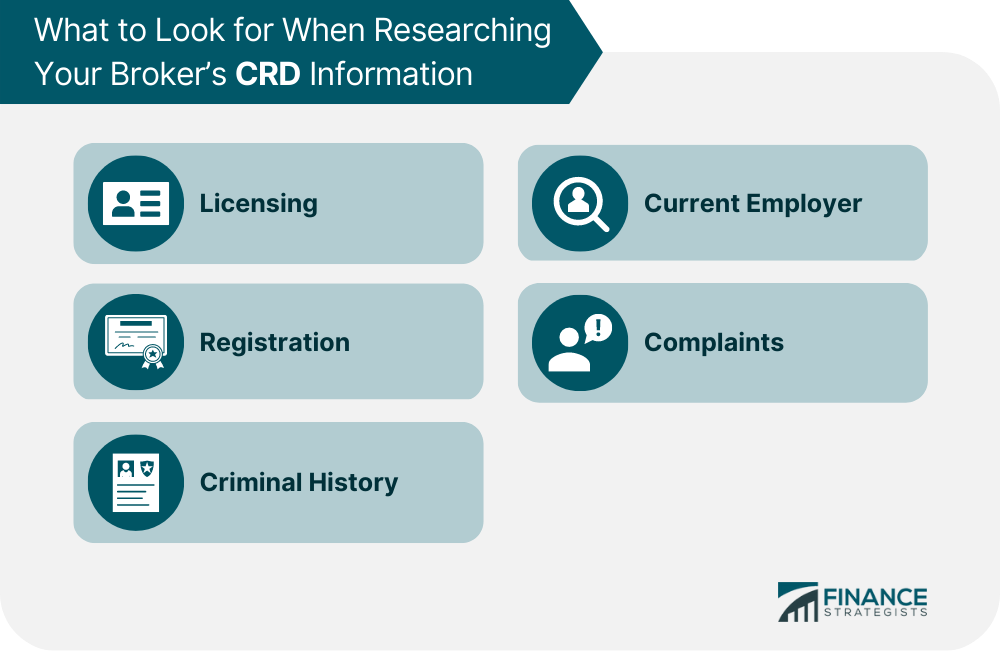The Central Registration Depository is a database maintained by FINRA since 2007 for all firms and individuals involved in the U.S securities industry. It has been used to store information on registered brokers and those who dispense investing advice or make recommendations on securities. A Central Registration Depository (CRD) number is assigned to anyone involved in the industry, from brokers and advisors to sales associates and employees of firms who are registered with FINRA. When you research your broker's CRD information, ensure that the state securities regulator and FINRA are both contacted. Sometimes these two agencies have different data on file for brokers, so it is best to contact them all at once with this request. There are many factors to consider when researching your broker’s CRD information. These include: A Central Registration Depository check will reveal what type of license the broker holds in your state. If you live in a state that requires registration or licensing (such as California, New York, and Texas) but the Central Registration Depository does not show this for your broker, it is time to investigate further. Be sure to look up all licenses held by any individuals involved with your investments if you are unsure which details need checking. Central Registration Depository also provides information on what type of registration a broker or individual holds. This includes registrations such as Series, Principal, and General Securities Representative (Series 27). A check of the Central Registration Depository will reveal if a broker has been convicted of any crimes and what those charges were. Any recent criminal activity could be cause for concern, as well as arrests that have not led to a conviction. Some behaviors such as insider trading can lead to disbarment by brokers' home states even without criminal convictions against them. These offenses should also show up on their Central Registration Depository records upon request. Still, sometimes they do not appear there until later due to state authorities' lag time in reporting. The Central Registration Depository will reveal what firms a broker is currently registered with. Sometimes brokers leave one firm to work for another, or they may have been fired from their previous job and are now unemployed. In either of these cases, you should be able to find out where your broker has worked previously and how long they were there. Central Registration Depository records will show any complaints that have been filed against your broker or financial adviser. A Central Registration Depository check can also reveal if a complaint has been dismissed without investigation, meaning the incident was not found to be significant enough by FINRA for further action. One of the essential resources for investors is FINRA's BrokerCheck program, which provides background information on more than 6,800 registered brokers and dealers and over 660,000 active individuals to potential customers. FINRA's BrokerCheck program allows investors to make smarter decisions when investing in stocks or other financial products. In addition, interested parties can access CRD Data by calling (800) 289-9999. Investors may also want to check out where their state’s securities regulator has located this valuable resource because it varies depending on the location. Central Registration Depository (CRD) is a beneficial resource for investors to use when choosing a broker. It allows them to find vital information about their potential investment advisors, such as registration status and disciplinary actions taken against the individual or firm in question. Central Registration Depository records are also available 24 hours a day, seven days a week, making it possible to check on background information at any time of the day or night. Central Registration Depository data is available free of charge and can be accessed online in just minutes. These are all benefits that investors should take advantage of when choosing their next broker.
Have a financial question? Click here.What To Look For?

Licensing
Registration
Criminal History
Current Employer
Complaints
How Can Investors Request CRD Information?
Benefits of Using CRD

Final Thoughts
Central Registration Depository (CRD) FAQs
Central Registration Depository (CRD) allows brokers to register themselves with various securities agencies across the country. They can also keep their employment information up-to-date on this central system so that other states know which firms they have worked for previously.
The Central Registration Depository number is a unique identifier that brokers register and update their employment information with the Central Registration Depository.
Central Registration Depository is the only way brokers can register themselves with various securities agencies across the country. It also allows them to keep their employment information up-to-date on this central system so that other states know which firms they have worked for previously.
The Central Registration Depository database is an excellent resource for investors to use when choosing a broker. It allows them to find vital information about their potential investment advisors, such as registration status and disciplinary actions taken against the individual or firm in question.
The Central Registration Depository is available to investors and members of the public, not just securities regulators. It allows them to check a Central Registration Depository record from any computer with an Internet connection in just minutes.
True Tamplin is a published author, public speaker, CEO of UpDigital, and founder of Finance Strategists.
True is a Certified Educator in Personal Finance (CEPF®), author of The Handy Financial Ratios Guide, a member of the Society for Advancing Business Editing and Writing, contributes to his financial education site, Finance Strategists, and has spoken to various financial communities such as the CFA Institute, as well as university students like his Alma mater, Biola University, where he received a bachelor of science in business and data analytics.
To learn more about True, visit his personal website or view his author profiles on Amazon, Nasdaq and Forbes.











